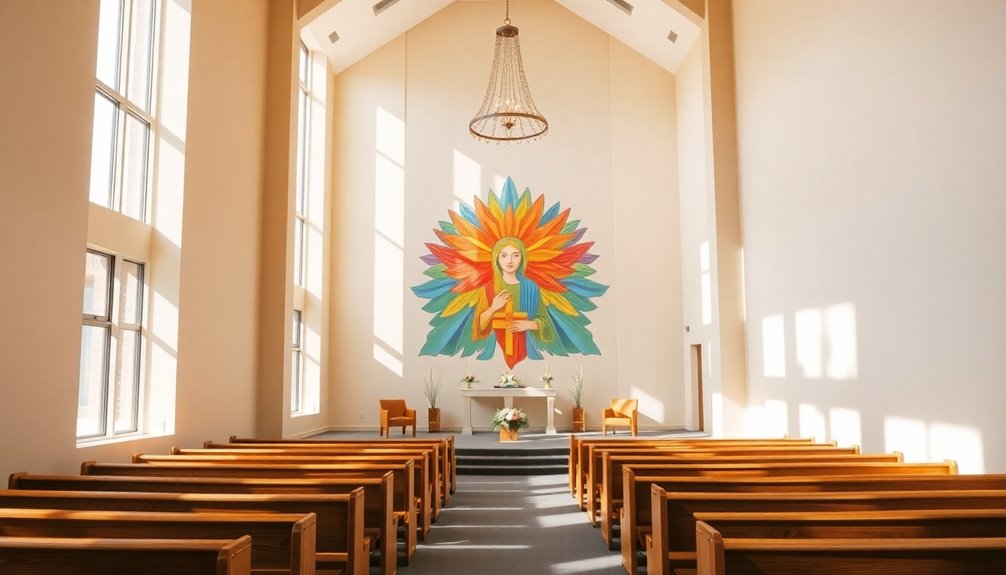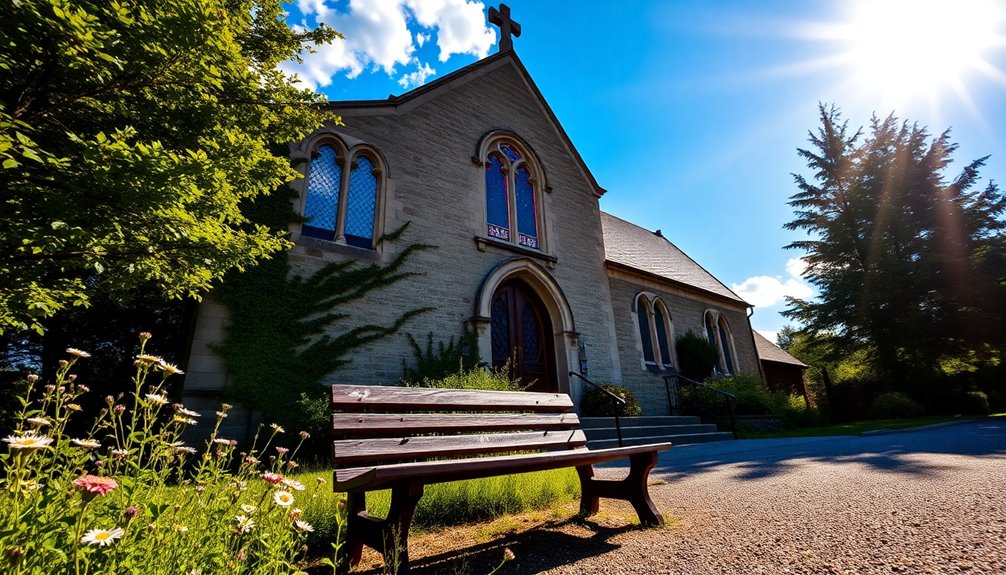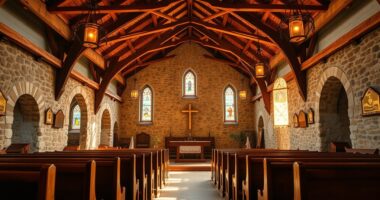Non-denominational churches give you a fresh, flexible way to connect with your faith. You won't be bound by specific doctrines, allowing you to explore spirituality on your terms. Services often feature contemporary music, relatable sermons, and a casual atmosphere, all centered around practical biblical teachings. These churches promote inclusivity, welcoming people from diverse backgrounds and beliefs. You can engage in community service, making a real difference locally. Plus, you have resources like online sermons and group studies to support your growth. If you're curious about how these communities operate, there's more to discover beyond the basics.
Key Takeaways
- Non-denominational churches offer flexible worship experiences without strict denominational ties, focusing on personal faith and community involvement.
- Services typically include contemporary music, relatable sermons, and practical biblical teachings relevant to daily life.
- These churches emphasize inclusivity, welcoming individuals from diverse faith backgrounds without requiring formal membership.
- Community engagement is prioritized, with volunteer opportunities and outreach initiatives addressing local needs such as homelessness and food insecurity.
- Educational resources, including online sermons and Bible studies, support spiritual growth and foster connections among members.
Introduction
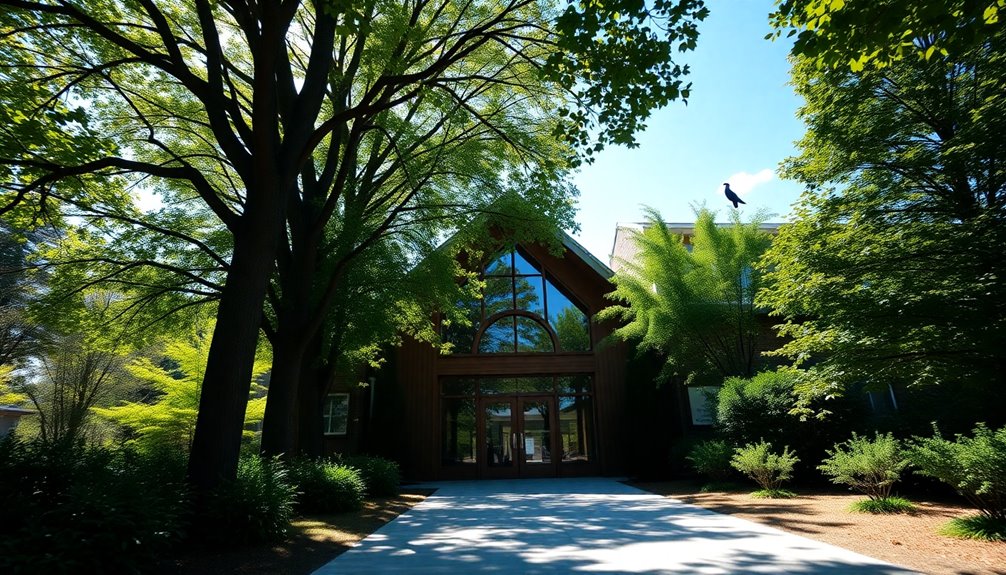
Non-denominational churches have gained popularity in recent years, attracting many individuals seeking a more personalized approach to their faith. If you're looking for a church that emphasizes a personal relationship with God and values community, a non-denominational church in Houston might be just what you need.
These congregations don't affiliate with a specific denomination, allowing them to create a flexible and diverse worship experience.
You'll find that services typically feature contemporary worship music, relatable sermons, and a casual atmosphere, making it easy to feel comfortable and welcomed. You can come as you are, without the pressure of fitting into traditional molds. The focus on practical teachings from the Bible helps you apply faith to everyday life, making it relevant and accessible.
Moreover, many non-denominational churches are dedicated to community outreach and service projects. Their commitment to social responsibility not only enriches the lives of members but also positively impacts the local area.
Biblical Textual Insights
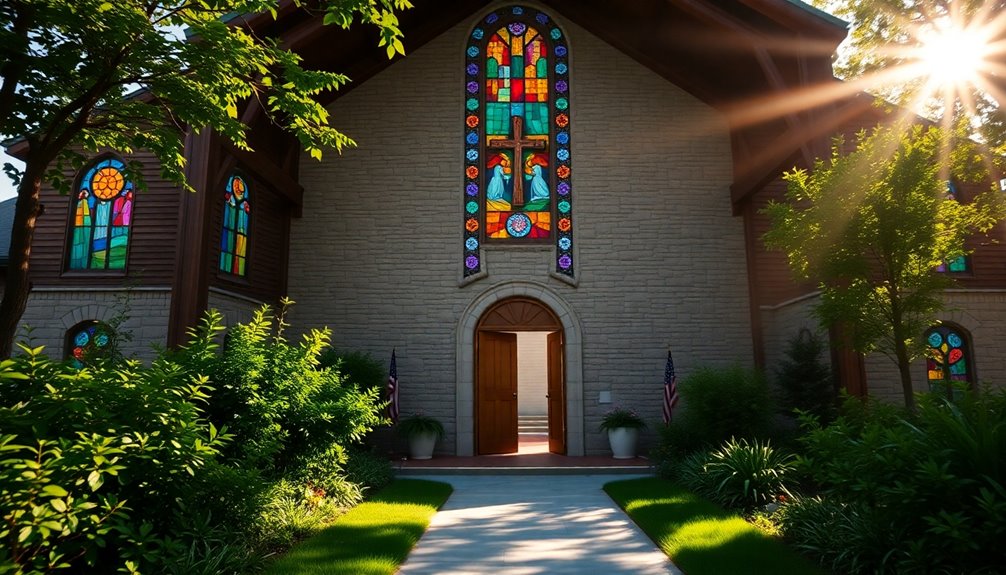
When you explore biblical textual insights in a non-denominational church, you'll likely encounter both primary and secondary Bible references that enrich your understanding.
These references help you connect the scriptures to your daily life and personal relationship with God. It's all about making the teachings relevant and accessible for everyone in the congregation.
Primary Bible References
At the core of many non-denominational churches lies a commitment to the Bible as the ultimate authority in faith and practice. If you're exploring a nondenominational church in Houston, you'll notice that biblical references play a pivotal role in their teachings. For instance, 2 Timothy 3:16-17 emphasizes the inspiration of Scripture, highlighting its significance for teaching and training in righteousness. This foundational belief shapes how members engage with the Bible daily.
Moreover, the Great Commission from Matthew 28:19-20 is frequently invoked, urging you and your fellow congregants to spread the Gospel and make disciples of all nations.
In these communities, Ephesians 4:11-13 is often cited, reflecting the importance of unity and the diverse spiritual gifts present within the body of Christ.
Additionally, Romans 12:2 serves as a reminder of the transformation of the mind through the Word of God, reinforcing the church's focus on personal growth and discipleship.
Secondary Bible References
In many non-denominational churches, the use of secondary Bible references enriches the understanding of scripture and its application. You'll often find congregations relying on personal interpretation of the Bible, stepping away from strict denominational doctrines. This flexibility allows for a deeper exploration of biblical principles through various resources like commentaries and theological texts.
Many non-denominational leaders prioritize teaching from diverse translations, making scripture more accessible to everyone. By engaging with different versions, you can appreciate the nuances in biblical language and context.
Additionally, they frequently draw upon historical accounts and writings from early church fathers, providing a broader perspective that enhances your understanding of teachings.
The approach to secondary references in these churches emphasizes practical application. You'll be encouraged to integrate biblical insights into your daily life, fostering a personal connection to the teachings.
This holistic approach not only deepens your comprehension of scripture but also aids in living out its principles. By exploring secondary references, you're equipped to navigate your faith journey with confidence and clarity, enriching both your personal relationship with God and your interactions within the community.
Religious Diversity in Philadelphia
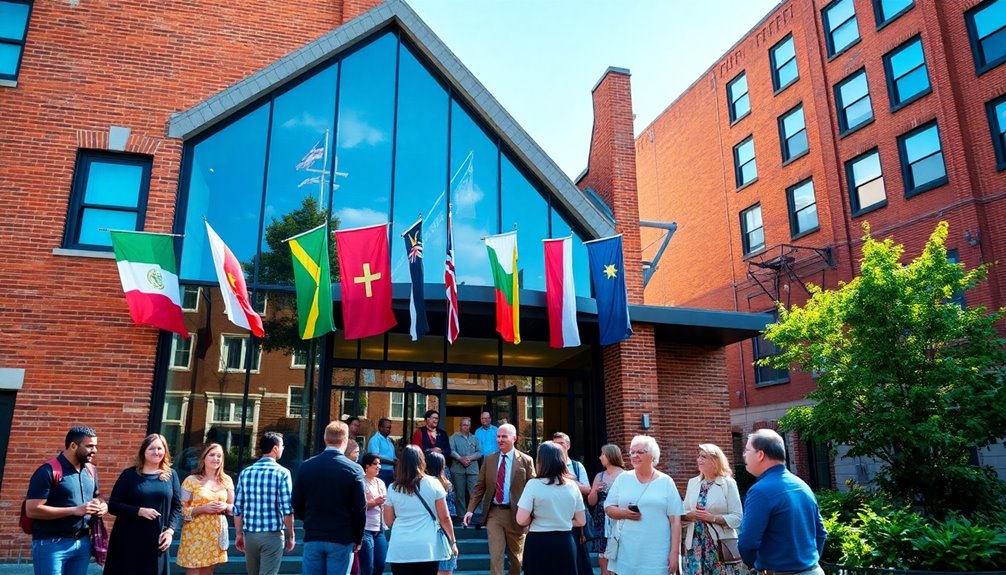
Philadelphia boasts a remarkable array of religious diversity, with over 200 different faith communities enriching the city's cultural landscape. You'll find significant populations of Christians, Jews, Muslims, and Buddhists, all contributing to a vibrant interfaith dialogue that fosters understanding and respect.
Approximately 40% of the city's residents identify with a religious group, showcasing how integral faith is to many in the community.
As you explore this rich tapestry, you may notice the growing presence of non-denominational churches. These congregations appeal to individuals seeking a more inclusive and flexible approach to spirituality, often emphasizing personal connection over traditional doctrines. This shift reflects a broader trend towards embracing diverse beliefs and practices.
Philadelphia also hosts various interfaith events and initiatives, where people from different backgrounds come together to promote cooperation and community. These gatherings not only celebrate the city's diversity but also help bridge gaps between faiths, allowing you to engage in meaningful conversations and build relationships. In this dynamic environment, you can witness how religious diversity enhances the social fabric, creating a sense of belonging for everyone involved.
Moreover, the city's rich history of civil rights narrative has significantly shaped its current landscape of religious tolerance and acceptance.
Biblical Context Explained Clearly
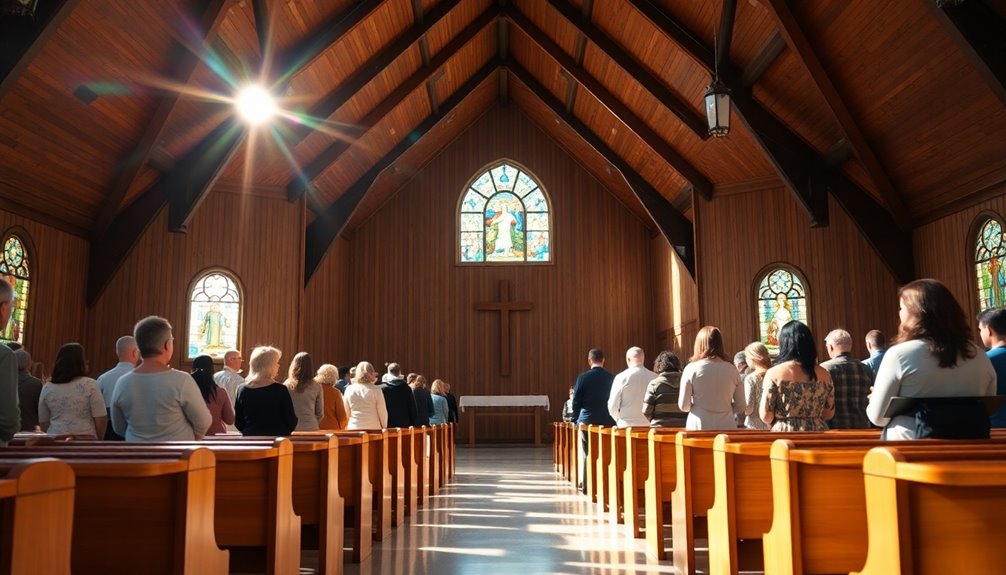
Many non-denominational churches prioritize a direct connection to the Bible, encouraging you to engage with scripture in a personal and meaningful way. Here, the focus is on the teachings of Jesus Christ and the New Testament, promoting core beliefs like salvation, grace, and community involvement.
You'll find that these churches often emphasize personal interpretation, allowing you to apply biblical principles directly to your life. The teachings are presented in relatable and contemporary ways, making scripture accessible to everyone. This approach fosters a deeper understanding of biblical concepts, reinforcing the idea that faith is a personal journey rather than simply adhering to institutional rules.
Many congregations actively encourage you to participate in worship and service, reflecting the biblical call to love and support one another. In this context, the relationship you cultivate with God becomes central.
Non-denominational churches emphasize that faith isn't just about following doctrines but about developing a personal connection with the divine. You're invited to explore your beliefs freely, fostering growth and understanding in a supportive community that values each person's unique journey.
Misunderstanding Church Membership Requirements
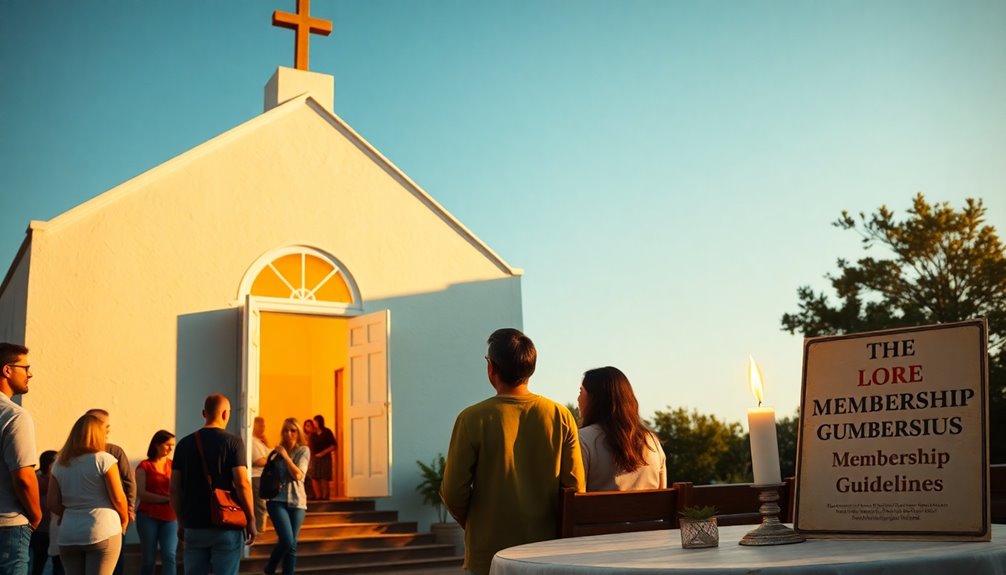
When you think about joining a non-denominational church, you might assume there are strict membership requirements like in traditional denominations.
However, many of these churches prioritize your personal faith and involvement over formal membership.
Let's explore some common misconceptions and concerns regarding doctrinal differences that might lead to misunderstandings about what membership really means.
Debunk Common Misconceptions
A common misconception about non-denominational churches is that they require formal membership to participate in their community. In reality, many of these churches welcome everyone to attend services and engage in activities without any commitment to join.
Unlike some denominations, non-denominational churches prioritize personal faith and relationships with God over traditional membership roles. You'll find that these churches foster an inclusive environment, encouraging individuals from diverse backgrounds and belief systems to come together.
Whether you have prior church experience or are exploring faith for the first time, you're invited to join in. This openness creates a space for exploration and growth, where you can learn at your own pace.
Most non-denominational churches offer opportunities, like "Connect Classes," for newcomers to understand their beliefs and practices. These classes are designed to inform, not pressure you into membership right away.
This approach allows you to explore your faith journey without feeling obligated, making it easier for you to find a community that aligns with your values and beliefs.
Concerns About Doctrinal Differences
Navigating the landscape of non-denominational churches can raise legitimate concerns about doctrinal differences, especially for those accustomed to traditional denominations. You might find that these churches often have flexible membership requirements, which can lead to misunderstandings about what's expected in terms of beliefs.
Unlike traditional churches, many non-denominational communities prioritize personal faith and relationships with God over strict adherence to specific dogmas. This emphasis can create confusion about what you need to believe to be a member.
Some people may assume that non-denominational churches lack doctrinal teaching altogether. However, they typically focus on core Christian principles while allowing for varied interpretations. The absence of a formalized doctrinal statement in some congregations can cause differing views on key theological issues.
This might raise concerns if you're seeking clarity on beliefs.
If you're considering membership, it's crucial to engage in open discussions with church leaders. Doing so will help you understand the unique beliefs and practices that distinguish a non-denominational community from traditional denominations, ensuring you feel comfortable and informed about your spiritual journey.
Community Service Involvement
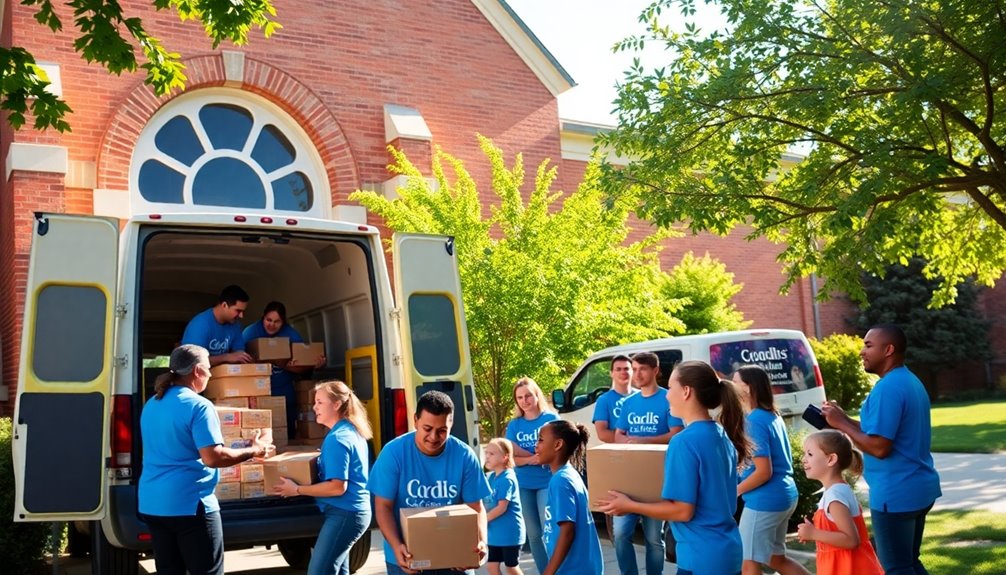
When you get involved with a non-denominational church, you have the chance to volunteer at local shelters and participate in outreach initiatives that directly benefit your community.
These opportunities not only help those in need but also allow you to connect with fellow members who share your passion for service.
Together, you can make a meaningful impact and foster a spirit of generosity.
Volunteer at Local Shelters
Volunteering at local shelters offers a meaningful way for members of non-denominational churches to put their faith into action. Many churches actively encourage their congregants to engage in this vital work, allowing you to serve the community while demonstrating Christ's love through tangible acts of kindness.
You might find yourself providing meals, organizing clothing drives, or simply offering companionship to those in need. These efforts not only help those who are struggling but also foster deeper connections within the community.
Participating in church-led initiatives often leads to increased involvement; some churches report over 100 volunteers at local shelter events annually.
As you engage in community service, you'll likely develop a profound sense of purpose and fulfillment, knowing that your efforts are making a positive impact in the lives of others.
Many non-denominational churches partner with local shelters to create regular outreach events addressing issues like homelessness and food insecurity. This partnership creates ample opportunities for you to actively engage in service, enriching both your life and the lives of those around you.
Local Outreach Initiatives
Local outreach initiatives are at the heart of many non-denominational churches, driving members to actively engage in their communities. These churches often organize food and clothing drives, providing essential support to underserved populations.
By partnering with local organizations, they tackle pressing issues like homelessness and poverty, mobilizing volunteers for hands-on community service days.
You might find that participating in community events such as health fairs and educational workshops not only promotes wellness but also fosters a sense of belonging among residents.
Many non-denominational congregations understand the importance of mentorship, connecting church members with youth to encourage personal and spiritual growth.
These outreach efforts create a ripple effect. As you engage in these activities, you'll notice an increase in community involvement, with more people stepping up to volunteer and contribute donations.
This heightened participation not only strengthens the church's mission but also builds lasting relationships within the community.
Embracing local outreach initiatives can transform your church experience, allowing you to make a tangible difference while connecting with others who share your passion for service.
Community Engagement Fosters Unity
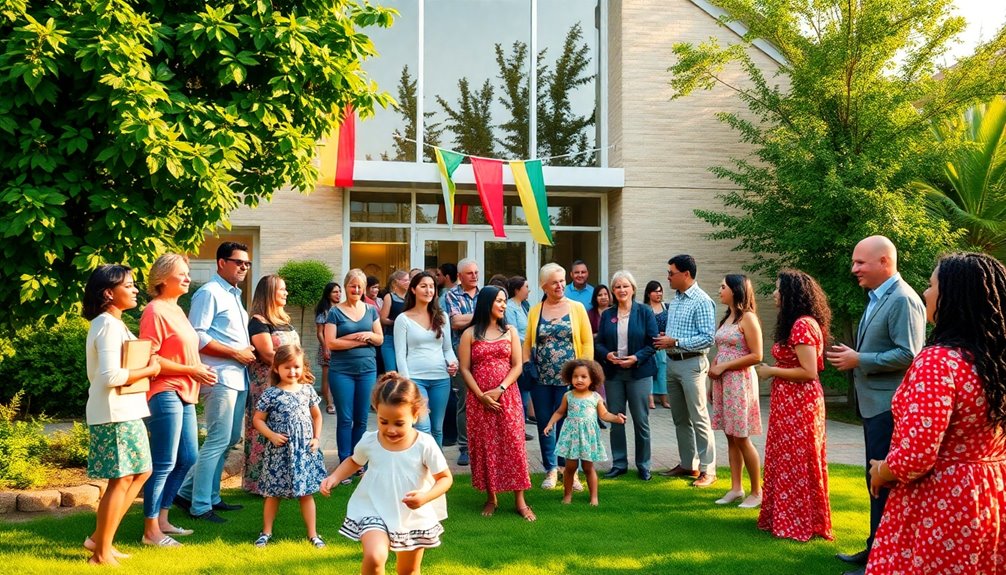
Community engagement in non-denominational churches acts as a powerful catalyst for unity among congregants. When you participate in church-hosted events, you connect with fellow members, fostering a sense of belonging.
Imagine enjoying a cup of coffee with someone you've never met, sharing stories that bridge gaps and create friendships.
City Life Groups are another fantastic way to deepen connections. These groups encourage meaningful discussions and help you build relationships, enhancing the overall community spirit.
You'll find that outreach programs play a crucial role as well, addressing local needs and promoting social responsibility. By getting involved, you contribute to a greater purpose while strengthening bonds with others.
With programs for all ages, from youth ministries to adult education classes, inclusivity thrives in non-denominational churches. Everyone has a place, and everyone's voice matters.
Plus, digital platforms for virtual events allow you to engage, even from afar, expanding the community's reach. This blend of physical and virtual connection ensures that no one feels isolated.
Ultimately, your participation in these initiatives not only enriches your life but also bolsters unity within the church community.
Additional Resources
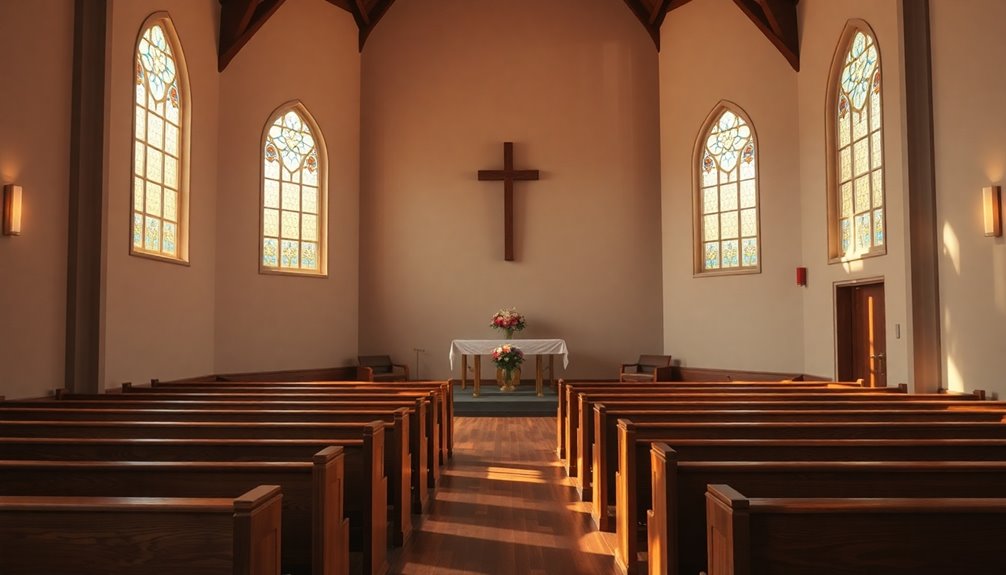
Numerous resources are available to support your spiritual journey in non-denominational churches. Many of these churches offer online sermons, podcasts, and devotional materials that help you grow in your faith. You can access these resources anytime, allowing you to engage with the teachings at your convenience.
Community engagement is a cornerstone of the non-denominational experience. Various groups and ministries invite you to connect with fellow members, participate in outreach programs, and build meaningful relationships. The welcoming atmosphere encourages you to come as you are, making it easier to get involved.
For those seeking deeper understanding, educational resources like Bible studies, classes, and leadership training programs are commonly provided. These opportunities foster a more profound knowledge of your faith and enhance your involvement in the church community.
Social media also plays a significant role in staying connected. Many churches utilize platforms to share updates, engage with members, and provide access to virtual events and discussions. By leveraging these resources, you can enrich your spiritual journey and feel more connected to your church family.
Frequently Asked Questions
What Does the Non-Denominational Church Believe?
When you explore the beliefs of a church, you'll often find a focus on personal relationships with God and the authority of Scripture.
Many congregations emphasize inclusivity, welcoming people from diverse backgrounds.
You might notice contemporary worship styles, engaging music, and active community involvement.
Spiritual growth is typically encouraged through prayer, fellowship, and Bible study, highlighting the importance of the Holy Spirit in your daily life and faith journey.
What Does It Mean to Belong to a Non-Denominational Church?
Belonging to a church means you're part of a community where you can grow spiritually and connect with others.
You'll find support, encouragement, and opportunities to serve together. It's about building relationships and sharing experiences in faith.
You can express yourself freely without fear of judgment, and you're encouraged to explore your beliefs.
The focus is on creating a welcoming atmosphere that prioritizes love, acceptance, and a shared journey in faith.
What Does It Mean When Someone Says They Are Non-Denominational?
When someone says they're non-denominational, it means they don't align with a specific religious denomination or tradition.
You might find that they value personal beliefs and experiences over established doctrines. This approach often fosters a more flexible and individualized spiritual journey.
Non-denominational individuals typically focus on the core teachings of the Bible, seeking a direct connection with their faith and encouraging community engagement without the constraints of traditional church structures.
What Does the Bible Say About Non-Denominational Churches?
The Bible emphasizes a personal relationship with God, encouraging unity among believers and focusing on Scripture as the ultimate authority for faith.
It teaches love and service to others, urging you to embody these values in your community.
By engaging in diverse expressions of worship, you reflect the joy and creativity found in the Psalms.
Ultimately, the Bible calls you to prioritize faith and community over strict adherence to denominational doctrines.

